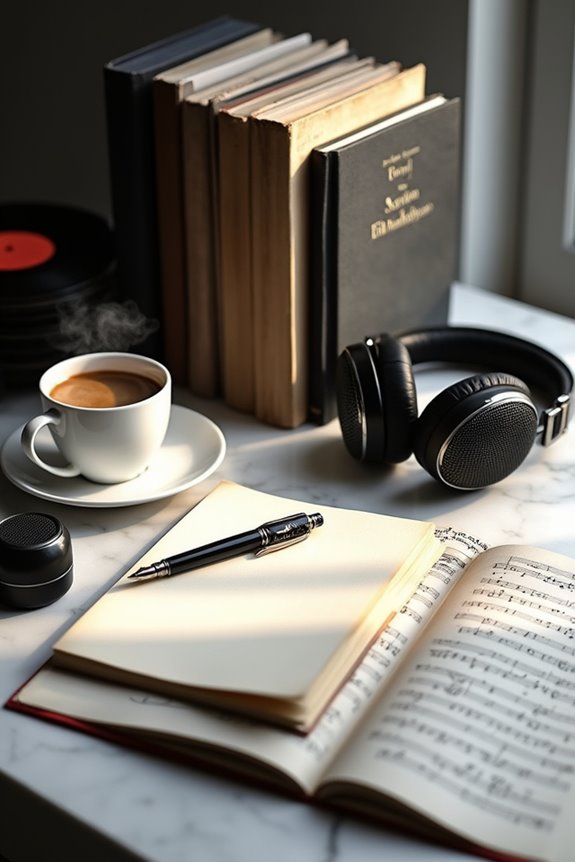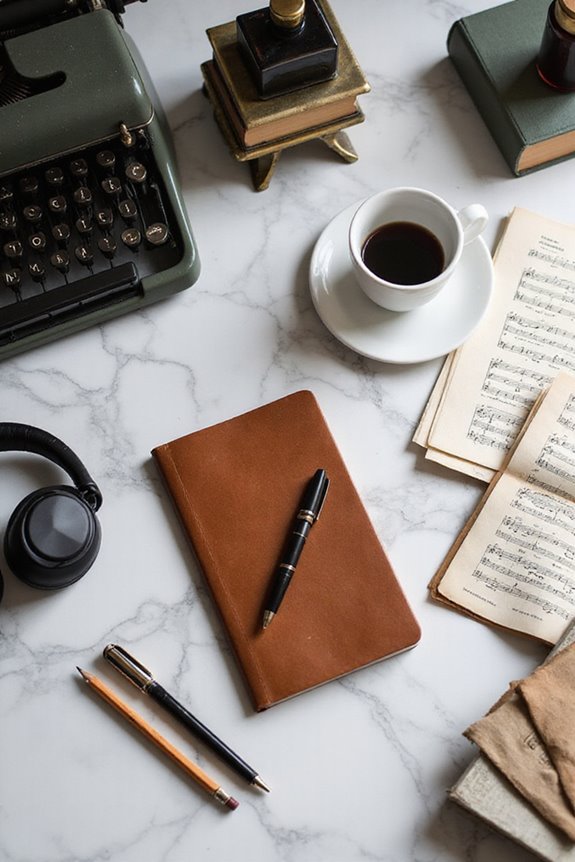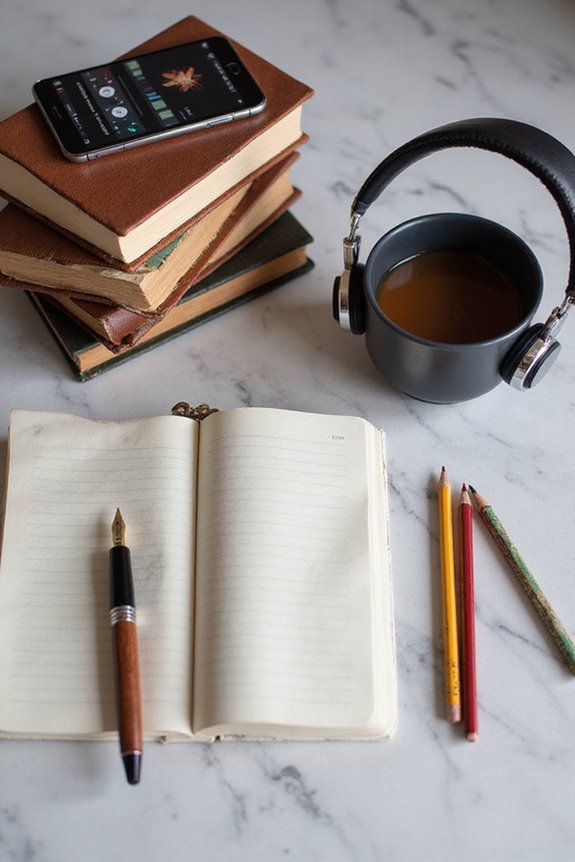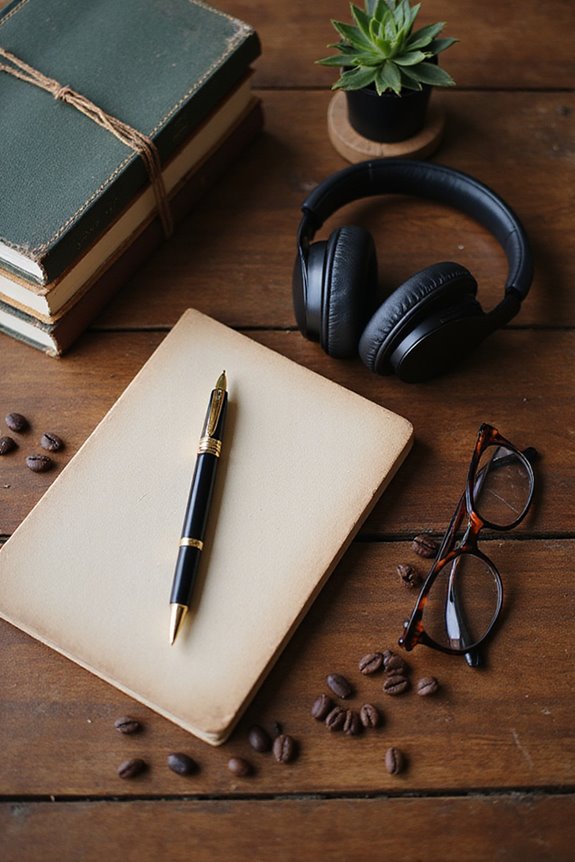Sure, music can definitely help us writers concentrate—if we use it wisely! Instrumental tunes, like classical or ambient tracks, are often best since they minimize lyrical distractions. We should aim for a tempo around 60-80 beats per minute to really get our minds flowing. Keeping the volume moderate is key too; too loud can break our focus. So, let’s experiment with different styles to find what sparks our creativity, and we’ll uncover even more tips along the way!
Key Takeaways
- Music can enhance focus, particularly when using instrumental tracks without lyrics, minimizing cognitive distractions during writing.
- The ideal tempo for concentration is 60-80 BPM, supporting a relaxed alertness conducive to writing.
- Engaging with calming music can reduce anxiety, creating a relaxing atmosphere that improves productivity.
- Classical music is effective for complex writing tasks, while upbeat tracks may benefit more routine tasks.
- Developing a personalized playlist of suitable tracks can boost concentration and enhance overall writing sessions.
The Science Behind Music and Focus

When it comes to writing and focus, understanding the science behind music can really help us decide what to play in the background—or whether to play anything at all. Research shows that our preferred music genres can sometimes become cognitive distractions, pulling our attention away from writing. Curiously, we often perform best in silence, with sedative music being somewhat effective, but stimulative music tends to obstruct our thought processes. If we’re looking to enhance focus, we might want to choose faster tempos or major keys for energizing vibes, while avoiding lyrics to keep distractions at bay. So, next time we sit down to write, let’s consider the music’s tempo and genre—because the right background can either help or hinder our creative flow!
Emotional and Cognitive Benefits of Music

Music isn’t just a catchy tune we jam to on our way to school; it has real emotional and cognitive benefits that can enhance our concentration and productivity. Research shows that engaging with music can improve our cognitive flexibility—think of it as our brain’s ability to switch gears when faced with different tasks. When we listen to emotionally charged music, it aids emotional regulation, helping us process feelings without diving into distress. This can be super useful when we’re writing, as it reduces anxiety and creates a relaxing atmosphere. Plus, studies suggest that musical training boosts verbal memory and executive functions, supporting our learning abilities. So, next time you write, consider putting on some music to help focus!
Effectiveness Based on Task Type

As we explore how music affects our concentration while writing, it’s important to note that the type of task we’re tackling can really influence how effective music can be. For complex writing tasks, like research papers, we may find that music enhancing creative thinking helps us focus better. On the other hand, for routine tasks, having some background tunes can make the process more enjoyable and help us push through. Just think about it—working on an essay while listening to classical music might keep our minds engaged, while writing out mundane lists might benefit from upbeat, repetitive songs. Ultimately, understanding our task complexity and writing styles can guide us in selecting the right soundtrack for our writing sessions.
Choosing the Right Tempo, Volume, and Genre

Have you ever wondered how the right tempo, volume, and genre could transform our writing experience? Selecting music that aligns with our tasks can greatly boost our productivity. For deep focus, try tunes around 60-80 beats per minute (BPM). This range stimulates alpha brain waves, which help us concentrate. When it comes to volume control, keeping it at a moderate level is key; too loud, and we might lose focus. Non-lyrical tracks work wonders as they’re less distracting. Consider mixing genres too—steady beat music can keep us engaged, while the sound of nature can lift our spirits. Ultimately, experimenting with tempo variations and finding our ideal soundscape is the secret to a more productive writing session.
Research Insights on Writing Output and Quality

When diving into the world of writing, we might think that silence is golden, but research shows that the choice of music can actually play a pivotal role in our writing output and quality. For instance, when we listen to our preferred genres, like jazz or classical, we often write more words and stay focused longer. However, popular songs with lyrics can distract us, creating that “mental traffic jam” we all dread. So, let’s be strategic! Choosing instrumental music may help us release creativity and enhance quality while reducing mind wandering. Remember, everyone’s music preferences impact their writing differently, so experimenting with various genres could lead to the productivity boost we’re looking for in our writing sessions!
Practical Tips for Using Music During Writing Sessions
To kick off our writing sessions on the right note, we need to choose our music wisely. Let’s aim for instrumental tunes, like ambient or classical tracks, since lyrics can really mess with our concentration. For playlist customization, find tracks with a tempo around 60-70 beats per minute; they align with our resting heart rate, helping us focus better. Make sure to keep the volume at a sweet spot—not too soft, but definitely not blasting—so it adds to our creativity without stealing our attention. And remember, it’s okay to experiment! We can discover different genres and styles to find what fits our auditory preferences. Soon enough, we’ll have a go-to playlist that makes writing sessions a breeze!
Frequently Asked Questions
Can Music Improve Creativity in Writing Beyond Just Concentration?
We’ve found that music provides melodic inspiration and enhances our rhythmic flow, boosting creativity in writing beyond merely helping us concentrate. By engaging our emotions, it fosters fluid thinking and greater expressive outcomes.
Does Listening to Music Affect Different Genres of Writing Differently?
We’ve noticed that music affects writing genres differently, with lyrical inspiration often enhancing songwriting but disrupting poetry or narrative tasks. Understanding these genre-specific effects can help us choose the right music for our writing sessions.
How Do Personal Preferences Impact Music’s Effectiveness for Writing?
Did you know 35% of people prefer pop and indie genres? Our personal taste in music greatly shapes its effectiveness for writing, as genre influence can either boost concentration or create distractions depending on individual preferences.
Can Silence Be Beneficial for Certain Types of Writing Tasks?
We’ve found that silent environments can greatly boost our writing focus, especially during tasks requiring deep concentration. Embracing moments of silence enhances our creativity and allows for valuable internal reflection, ultimately enriching our writing process.
What Are Some Common Mistakes When Using Music for Writing?
Ever found yourself lost in a chaotic music genre? We often make mistakes, like ignoring distraction levels or sticking to a single playlist. Let’s explore how to choose wisely and enhance our writing experience together!





